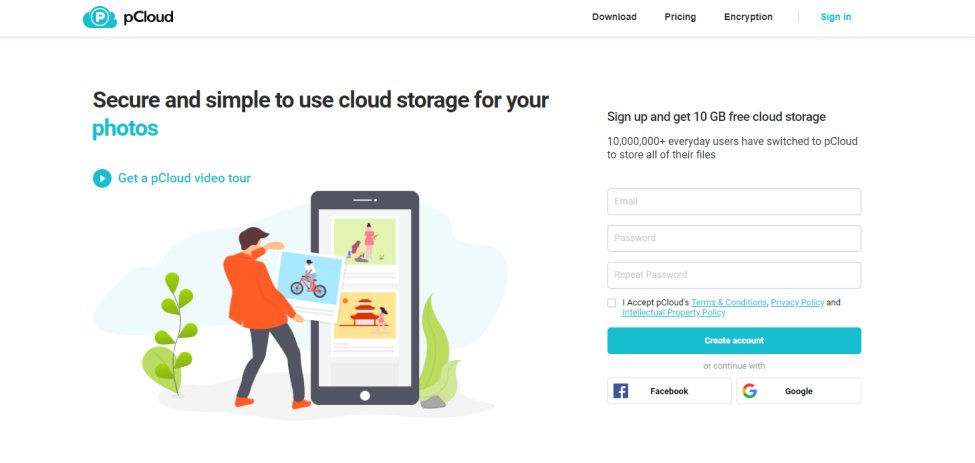TechRadar Verdict
While it can share and sync all types of files, pCloud is especially suited for multimedia content. The feature-unrestricted free plan gives you enough space to sample all the features of the service.
Pros
- +
Feature-unrestricted free plan
- +
Integrate with social media
- +
Block-level sync
Cons
- -
No document editor
- -
No add-on services
- -
UX could do with some work
Why you can trust TechRadar
We've tested some of the best cloud storage services, and pCloud stands out. This Swiss-based service offers an impressive range of features at an attractive price, making it an excellent choice for sharing large files with friends and family or syncing them across all your devices.
However, in a market dominated by established platforms like Dropbox, Google Drive, OneDrive, Box, and others, how does a product released in 2013 compete?
pCloud: Pricing & plans
The Premium plan offers 500GB and costs $300 as a one-time payment or $50 per year. The 2TB Premium Plus is priced at $600 for a lifetime and $100 a year.
The Ultra plan, designed for those with extensive storage needs, offers 10TB for a flexible price of $1,890 for a lifetime, giving you the freedom to choose the best option for your needs.
The family plan, a financially savvy choice, offers 2TB of shared storage space among up to five pCloud users for a lifetime purchase of only $595.
Business users are limited to a subscription-based membership. This costs $10 a month or $96 per year per user, per user. A minimum of three users is required. Each user gets access to 1TB of storage and 180 days of file versioning, compared with the standard 30 days for personal plans.
All pCloud accounts, whether gratis or paid, offer the same features. However, you can subscribe to a couple of add-on services for added benefits.
Sign up to the TechRadar Pro newsletter to get all the top news, opinion, features and guidance your business needs to succeed!
One is called Extended History. By default, pCloud retains files you’ve deleted for 15 days in the Free plan and 30 days with the Premium plan. However, you can extend this period to 360 days for $80 a year. pCloud Crypto, which adds client-side encryption to your account for $50. With this add-on, you can encrypt your data in a dedicated 'crypto drive' folder using a multi-layered algorithm.
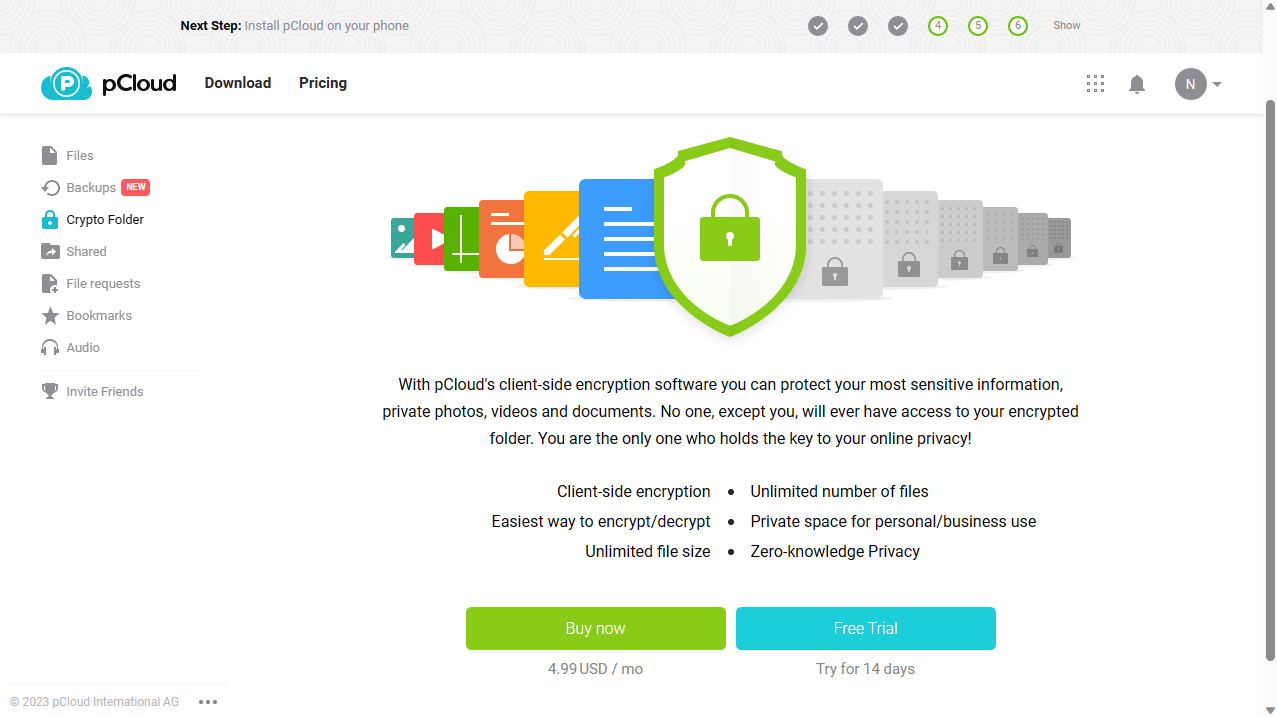
pCloud: Interface & experience
If you’ve ever ambled down a typical street in Geneva or Zurich, you’ll immediately recognize the same regimented and refined air carried across the cloud storage app. Visiting the country, we were struck by how clean and tidy the whole place was, as it’s immaculate for the most part. The same can be said for pCloud.
That’s not to say that this is the best designed cloud storage solution on the market. Frankly, the interface can sometimes feel a little aged. But we found the parallels irresistibly hard to ignore.
To get started you can register with the service manually or use the single sign-on to log in with your Apple ID, Google or Facebook accounts. Out of the box, the service has a handful of folders with sample data to help you get started by exploring its sharing features. These include some colorful pictures, music, a video and a PDF on getting started with pCloud.
The service has impressive file manager features, letting you sort and search through shared files with relative ease. You can also search for files, then filter the results based on file types. It's all pretty much the same as using the same options as you get with the file manager in your operating system.
For uploading, it’s just as simple. You’ll be dragging and dropping files from your desktop into the pCloud web app or using the upload manager. This option helps you keep an eye on the files as they are being uploaded into your pCloud account.
To ensure you are using the service to the fullest, pDrive’s web interface has a six-step wizard at the top of the interface. For example, it’ll guide you to install the desktop and mobile apps. As an incentive, completing each step will unlock more storage space.
The multi-platform desktop client is fairly intuitive, installing as a desktop applet in the status bar. It adds a virtual drive in your file manager, which is a mirror copy of your pCloud account, similar to how Dropbox operates. If you’re using an M1 Mac, you’ll likely need to reboot the device in a reduced security mode to allow the deeper integrations required by pCloud’s file syncing drive.
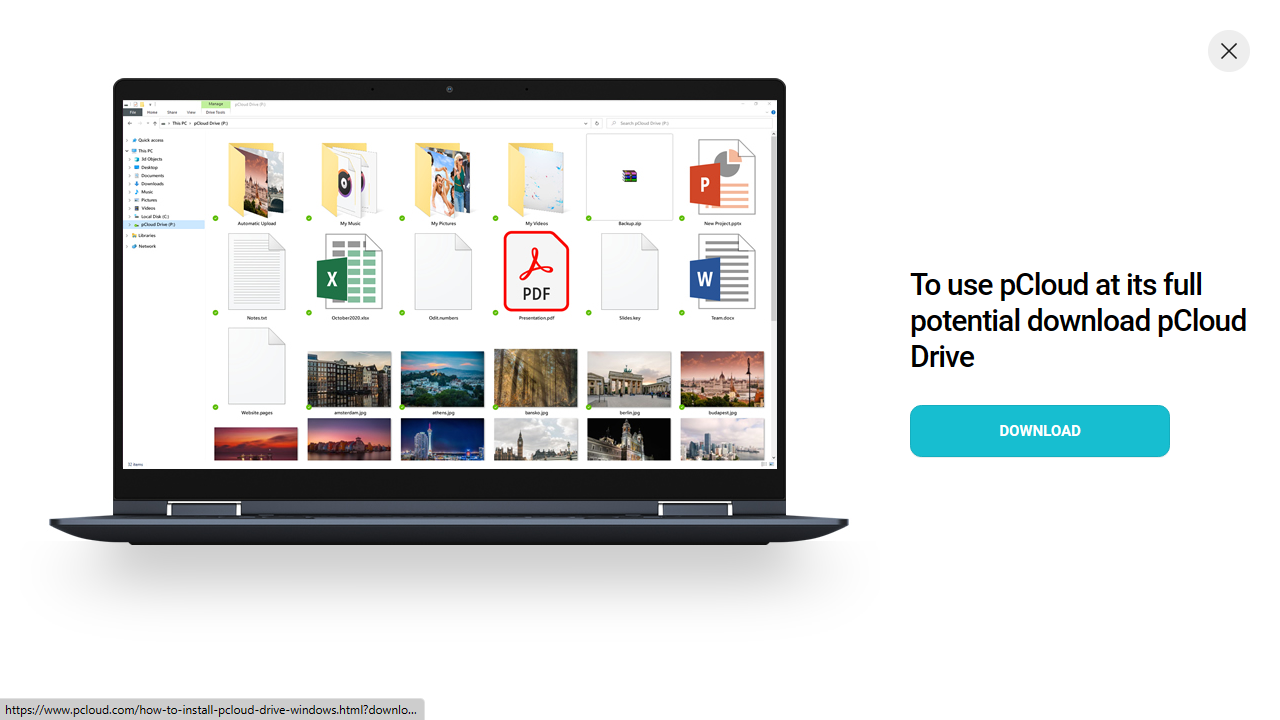
Upon first install, we noticed that pCloud automatically created a network drive to install files. On our Windows 11 machine, appropriately enough it also assigned itself the drive letter 'P'.
Any files placed in this drive will automatically be synchronized with your pCloud account and can be accessed from anywhere using the web interface. They do not take up any space on your hard drive itself.
There’s also an offline mode that makes the shared files available to you on your computer even when you aren’t connected to the internet. This allows you to work on the files while you are offline and then automatically sync the changes as soon as you're connected to the Internet.
You have the option of directly sharing files with your friends and family from the pCloud virtual drive. To share a folder you can send email invitations using pCloud and select whether you want to allow them to edit the contents of the shared folder or just view its contents. pCloud lists two separate URLs if you want to share using links. There’s one that’ll allow the recipients to download the contents of the folder and another if you want them to be able to upload content into the folder as well.
The mobile app offers one additional option - a setting to upload videos and photos to pCloud directly from your phone. By default it’ll upload all photos and videos but you can tweak its settings to restrict uploads.
Besides their desktop client, pCloud also offers browser extensions for Firefox, Chrome, and Opera. Once installed, you can use the extension to save audio, video and pictures straight from a web page to your pCloud account. You can also save a selection of text that’s automatically saved as a text file.
When it comes to using the browser for accessing your files, the process should be easy for most with things laid out as you would expect. The desktop client is full of features. We value the bandwidth throttling control, which by default is set to unlimited. However, we were disappointed to see that it's not possible to maximize the window in order to lay out all the options as clearly as possible.
If you choose to try out the client-side encrypted drive pCloud Crypto, this should mean everything remains protected even from pCloud workers thanks to zero-knowledge security. Consequently, you need to make a note of your secure key because not even pCloud can help you gain access to lost files.
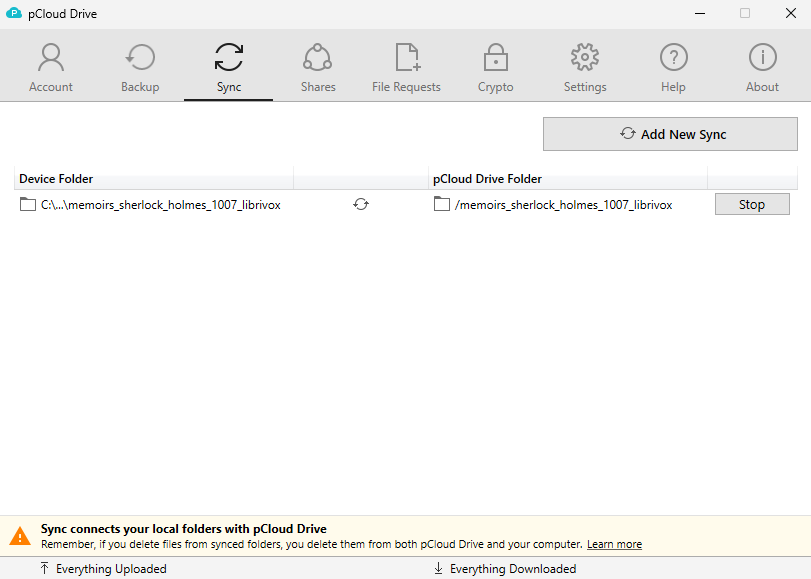
pCloud: Features
pCloud offers all the essential features you’d expect from a sharing and syncing service. In addition to an intuitive web interface, pCloud also has clients for all the major desktop operating systems including Windows, macOS, and Linux as well as apps for Android and iOS.
The service makes it easy to share individual or groups of files and folders without much effort. There is also no restriction on the size of the files you share as long as they are within the storage limits of your subscription plan, and upload and download speeds are also free of any restrictions.
Beyond sharing, you can use the desktop app to sync any local folder from your desktop to your pCloud account. Be aware that any files deleted in pCloud will also get deleted from their primary location on your computer, and vice versa.
On top of it, the service does block level syncing. This means the transfers will be a lot faster as only parts of the files that have changed need to be synced.
pCloud: Media support
You can share all kinds of files on pCloud - but its handling of media files deserves special mention. The web interface of the service includes audio and video players that enable you to play the shared media files straight from pCloud itself. While a web browser that can play media is hardly sensational, we noticed that during our tests that when we opened a file from an audiobook, the interface automatically created a playlist. There's also a dedicated audio section in the pCloud web interface where you can manage your albums and playlists.
Then there’s the video player that lets you watch the videos in picture-in-picture mode to help you continue using your browser while watching the video. You can even create slideshows for any shared images.
Social media backups are also one of pCloud’s specialties. We found that without much effort, you can connect the service to popular social media sites like Facebook and Instagram, then backup images and videos on your accounts directly into pCloud. There is added support for OneDrive, Dropbox and Google Drive backups, too.
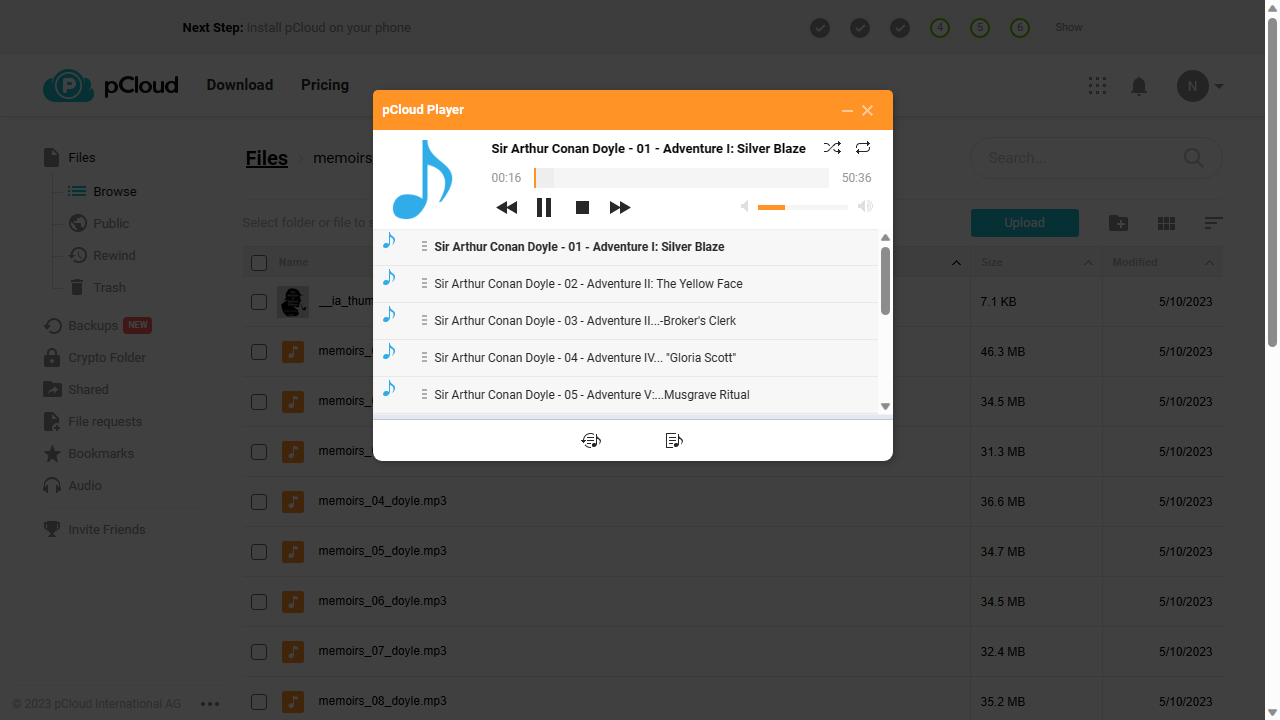
pCloud: Apps
We found a good range of flexibility when it came to platform availability. On desktop, you can use Windows and macOS, with a Linux version available in AppImage format. There are cloud storage apps for Android and iOS. And web access is great, with extra functionality with the browser add-ons. Overall, a good package.
pCloud: Security
In terms of security, all the file transfers are conducted over a TLS/SSL encrypted channel to ensure that your data remains secure. pCloud also claims to replicate your files in five different server locations to safeguard against data loss and ensure availability. The service also offers two-factor authentication (2FA) for added security.
Encryption is secured during file transfer and storage, however for a more complete guarantee non-business users will want to pay extra for client-side encryption which means that content is fully encrypted end-to-end.
In fact, pCloud is so confident of their security, they offered $100,000 as part of the 'pCloud Encryption Challenge' to anyone who could break their system. None of the 2,860 participants could do it, even after six months of trying.
As reassuring as this is, we do wonder if pCloud would be better off publicly releasing the source code for their client-side encryption feature so it can be constantly reviewed and updated by the community.
The service is also good at data control, letting you choose where you store your data - either in Luxembourg, which is part of the European Union, or its data center in Texas, USA. Swiss privacy laws are extremely strict and the company claims to be fully GDPR-compliant.
pCloud: Our tests
We conducted three main tests on pCloud: sync speed, file recovery, and versioning. The tests were performed on a Windows 11 virtual machine using the pCloud desktop client. The virtual machine was connected to the internet through a fiber broadband connection via a VPN server. During our speed tests, the VPN consistently maintained an average upload speed of 2328 Mbps.
- Test 1 - Sync speed
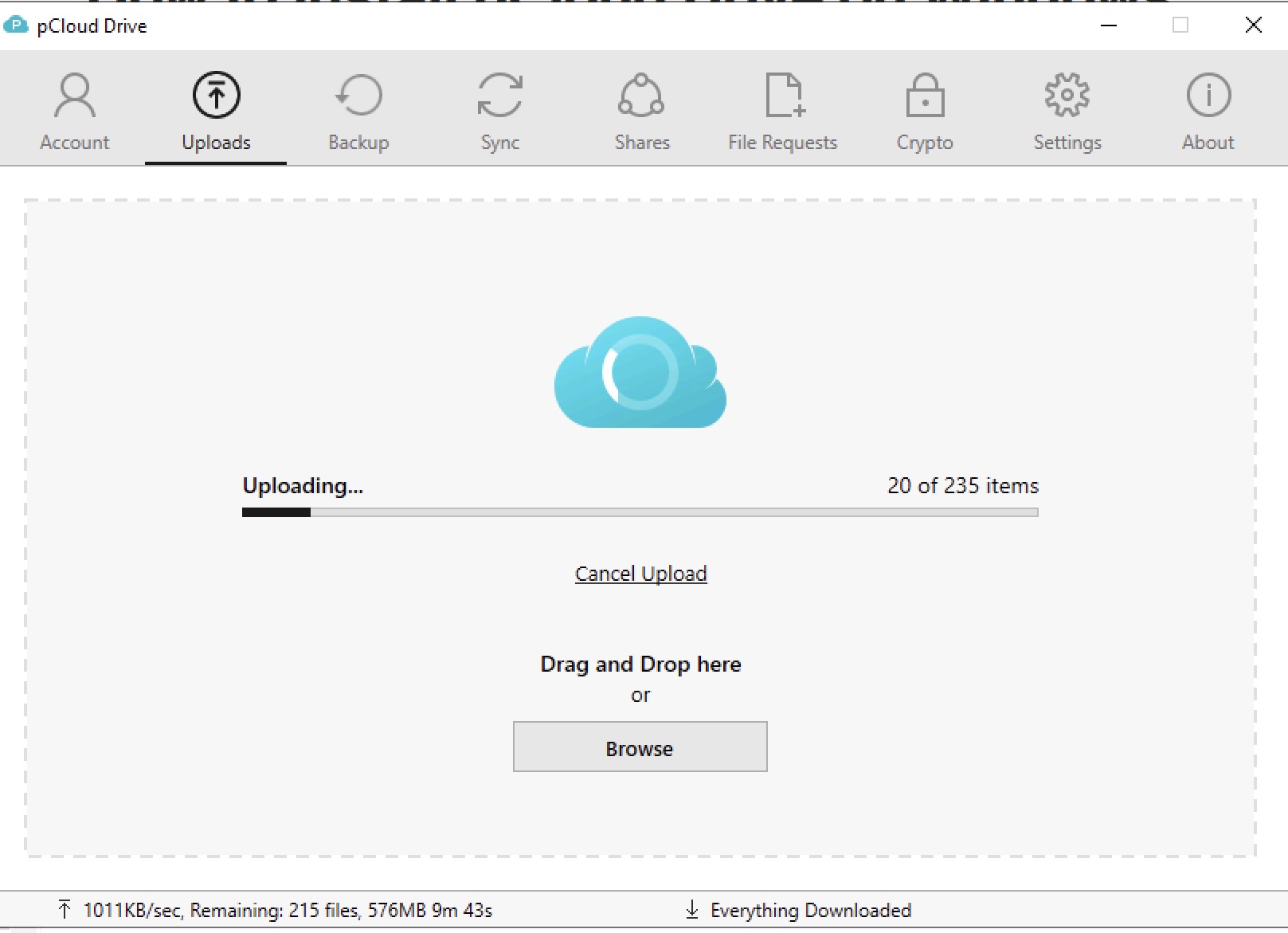
In our initial test, we synced a folder containing various MP3 files, images, metadata files, and a PDF, totaling 619MB across 240 files. After setting up the desktop client as a ‘sync’ folder, we could view the remaining files, the amount of data left to upload, and an estimated arrival time (ETA) on the status bar. It took a little over 40 seconds to complete the sync process. This performance places pCloud on par with iDrive, Internxt, and Apple iCloud in terms of syncing speed and efficiency puts pCloud on par with iDrive, Internxt and Apple iCloud in terms of syncing speed and efficiency.
- Test 2 - File recovery
During the test, we first deleted a folder from the application directory and then checked if it was possible to recover it. We also deleted a folder from My Documents while syncing it with pCloud. Despite a warning that files removed from our device would also be removed from the cloud, the folder was still in the pCloud network drive. We then removed the sync for the folder in question from the client without receiving any alert indicating that it could not sync the folder. Finally, we deleted the test folder from the pCloud network drive and restored our deleted files without issues using the Trash option in the web interface.
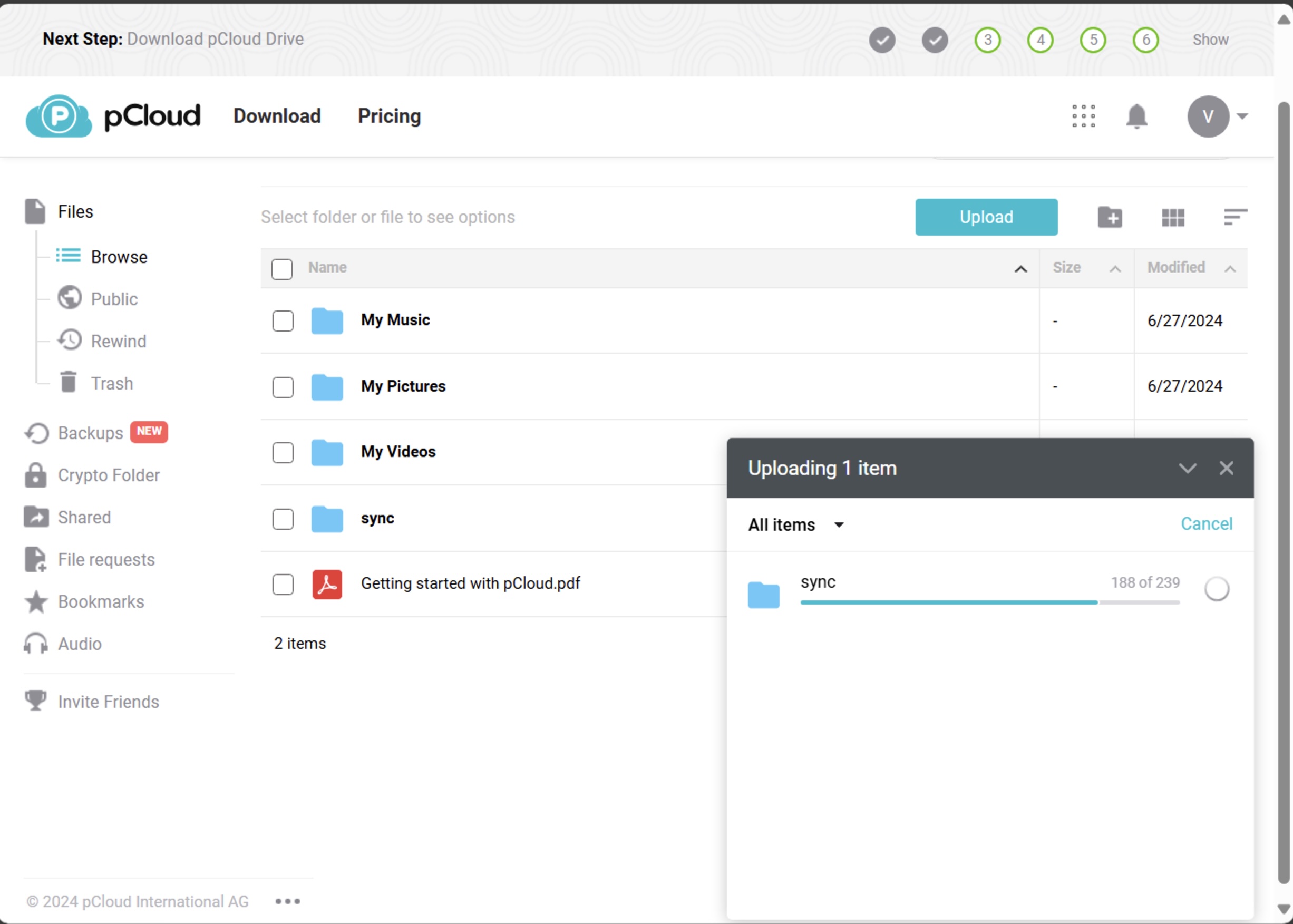
- Test 3 - Versioning
File versioning is crucial to prevent significant changes, especially when working on larger projects. If you accidentally make an unwanted change, you can quickly revert the file to its previous version.
During our testing of pCloud, we uploaded a test Microsoft Word document to the pCloud network drive and let it sync. After opening the document, we deleted all the text except for the introduction and let the updated file sync with pCloud.
Upon accessing the web interface, the Word document appeared under 'Files. ' By right-clicking, we found both the current version and the original under "Revisions." We restored the undamaged original document to the network drive with just two clicks.
We also discovered that the free version of pCloud only keeps file revisions for up to 15 days. A paid plan is required to extend this timeframe.
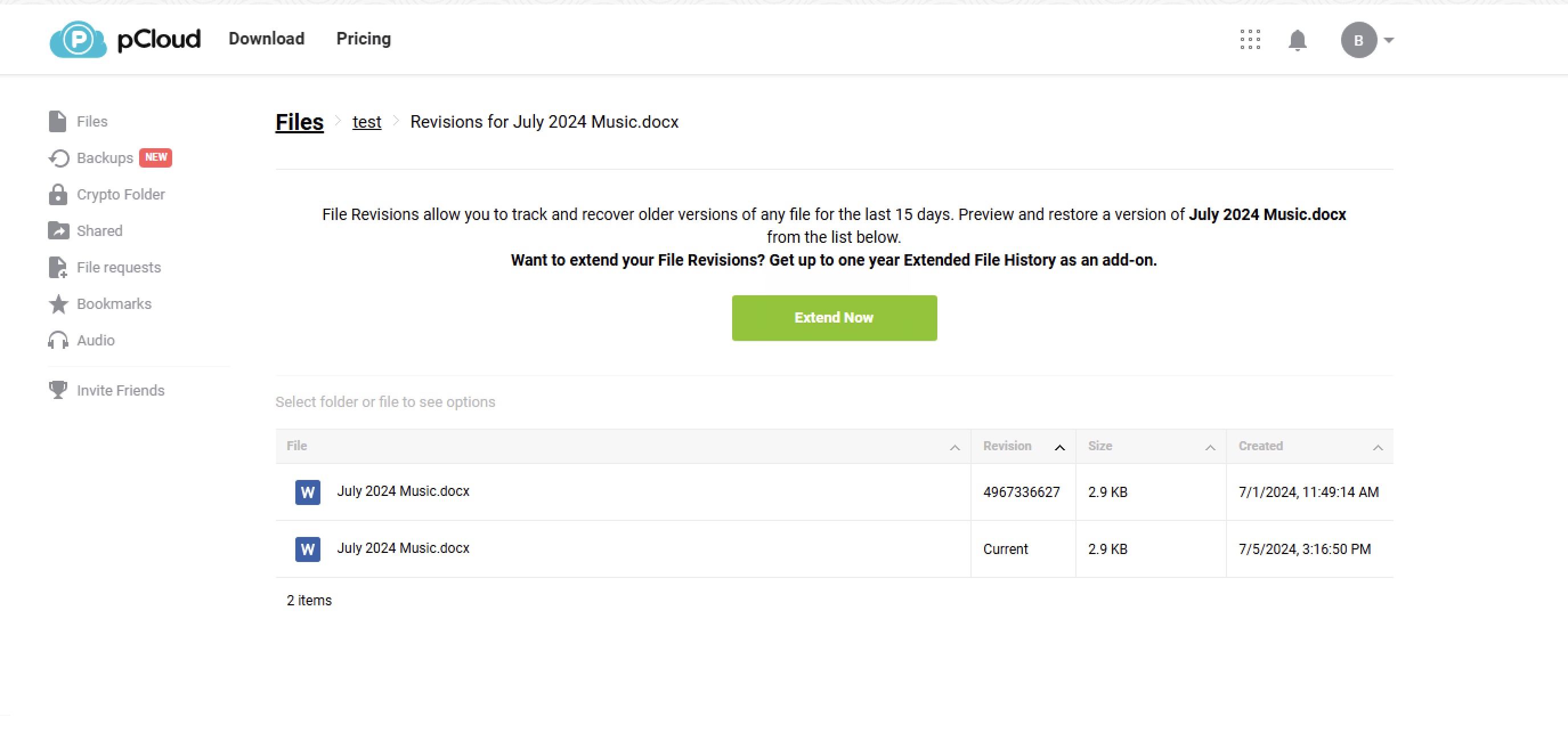
pCloud: Verdict
pCloud is a straightforward application offering typical cloud storage services. The current pricing plans are very affordable, especially for lifetime subscriptions. However, the product is not as polished as some competitors, and 2TB of storage may not be enough by today's standards. Adding client-side encryption for $4.99 a month is reasonable, but it's disappointing that it and the 'Extended File History' feature are not included in all lifetime plans for free. Due to its great value and extensive features, we confidently recommend pCloud for personal use, but businesses may require more flexibility.
With several years’ experience freelancing in tech and automotive circles, Craig’s specific interests lie in technology that is designed to better our lives, including AI and ML, productivity aids, and smart fitness. He is also passionate about cars and the decarbonisation of personal transportation. As an avid bargain-hunter, you can be sure that any deal Craig finds is top value!
